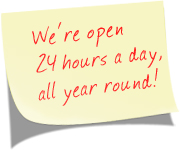This short document has a few key points that you should keep in mind, and print off if you need to.
- Start early and plan your time
Yes, we know you've heard it a million times, but it's hard to juggle lectures, work and partying. Starting early can be as little as sketching a plan of what should be completed and when. If there is reading and research to be done, starting early will help you greatly.
- Clearly understand the assignment/essay question
If the essay topic is assigned, then you should be sure that you fully understand the topic and any outlying factors that could be involved. If you've created your own question or hypothesis it will need to be specific, don't try to cover everything, or you will fail miserably. Underlining key words and relating them to the topic or lectures will be beneficial. Work out whether you have to state the facts with justified opinion or create a succinct report.
- Organise your research materials and your own thoughts
Not only do you have to read research materials, you also have to clearly organise information from various sources. You should highlight key points and make notes. As you progress, your thoughts should become more refined and you should be able to start picturing a cohesive flow of argument. Allow all of your thoughts to 'amass' and at this point you can further organise them by completing an outline of your paper.
- Learn from others
If you're confused on what to do then have a look at other essays that have been written. See whether the author keeps you interested with new and objective content. Does it flow and how do they make the topic interesting? Is language and style consistent throughout or does it tend to jump around? You may be interested and look at essays from the previous year, which will help you see whether you're at the right standard.
- Don't Plagiarise
Keep track of those references, quotations and direct citations. Do not copy other people's work in any way without correct references/citations, if you do you will be caught! It is cheating, plain and simple. Your professor/lecturer is an expert in their field; don't kid yourself, because you won't be able to fool them. They may read your work and be convinced they've read it a year or so ago, put it through plagiarism software and bob's your uncle, as they say, and you get caught.

- Write a draft
Don't worry about the important details (introduction and conclusion), get something down on paper, even if it jumps around and the grammar isn't so good; you will be able to tidy these up later. Be sure though, to get all information on the pages, fitting things in at a later stage may not be such a good idea.
- Short is sweet
Don't get overzealous by using extravagant words when you don't understand their meaning, use a thesaurus by all means, but add words that will be in the right context. Deciding on the wrong word may confuse and annoy the reader, which is not what you want. Keeping sentences short and concise is a must, drawn out sentences only bore readers and confuse the message you are trying to pass on. Go through your work, take out words that can be removed without effecting the clarity and flow of a sentence, as these are worthless and it will help with your word count too.
- Presentation is everything
So you're a genius, huh? Well, maybe you are, but don't let that prevent you from noticing spelling and grammar mistakes, and strange typos. You will get marked down for these, maybe due to policy requirements or the lecturer getting tired of reading sloppy work. If you don't know what format or style is applicable to your University or School, then you should ask your tutor for a copy of the guidelines and then review them against your work. Don't forget to do a spell check on your work, it may save the most embarrassing mistakes in your document.
Let Supaproofread.com take a look at your document.
We'll check for typographical, spelling, grammar and punctuation errors. And that's not all; we'll also provide you with feedback on how you can improve the clarity and tone of your work. Visit our student essay proofreading section, where you can get your essays and dissertations proofread and edited.





